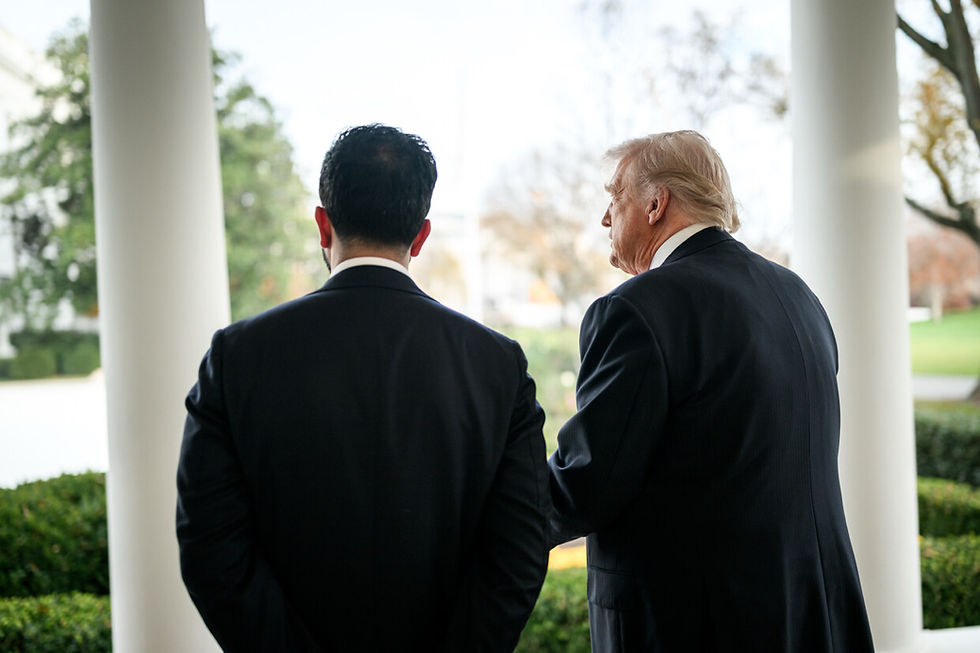The Running Man, Disinformation, and Grassroots Activism
- Cianan Sheekey

- Nov 24, 2025
- 4 min read

Fun, smart, action-heavy, angry, and above all, politically aware are all accurate labels for Edgar Wright’s new film, The Running Man. Famous for his helm of cult-classic Shaun of the Dead, The Running Man is Wright’s first Stephen King adaptation, whose works are genre-defining, many having been adapted into equally impactful films. The Shining, Shawshank Redemption, The Green Mile, and It spring to mind, and while King is far from an apolitical writer, The Running Man has had a tremendous amount of contemporary political relevance injected into it, turning it into not only Hollywood’s newest fast-paced thriller, but also a piece of timely commentary.
To summarise the film’s plot: Ben Richards is a father who recently lost his job due to his work with trade unions. Where does he turn when he can’t afford medication for his ill daughter? The brutal game shows run by the all-powerful, sadistic Network, of course. Signing up for the game show from which the film derives its name, Richards (the use of the last name here is thematically appropriate, as we’ll discuss later) is tasked with surviving a month with a trained militia, with all the powers of an authoritarian state, hunting him. Quickly, however, Richards discovers that the Network is using disinformation, deepfakes, and impressive editing to turn the nation against him.
At a time in which what’s true and what isn’t feels increasingly unknowable, The Running Man paints a surprisingly powerful picture of grassroots activism. During his time on the game show, Richards, through a mix of fortune, wits, and immense grit, withstands the state's efforts and survives despite many having bought into the Network's lies, actively trying to inform on or kill him. In the process, he slowly becomes a symbol against the authoritarian establishment, ‘Richards Lives’ becoming a rallying cry for liberty, as Richards himself becomes a revolutionary symbol, known more so for what he represents than as an individual.
But Richards isn’t some superhero. He’s angry to a fault, reckless, short-tempered, but deeply compassionate, hard-working, and an impressively quick thinker. He’s ordinary, in the sense that, like the rest of us, he’s a mix of good and bad traits, and not some moral arbiter or Machiavellian genius. He’s designed to embody the everyman, hence the distinctly standard name choice. The film highlights the significance of the ordinary in challenging the political status quo, but does so without being ideologically loaded.
You can easily interpret this film as anti-capitalist, and there are certainly hints of that, but that’s more the result of the framing of the plot than anything else. Richards and his fellow working-class labourers find themselves under the thumb of a corporation, not in a capitalist but a corporate libertarian state. And in such a world, being anything but anti-corporation would be a risible position. The film is warning us of what could happen, certainly, as all dystopians do to some extent, but that isn’t its primary lesson. The Running Man is an extraordinary film that primarily asks you to focus on the power of the ordinary, especially in the face of hardship and apathy.
The film hasn’t set up this world for the sake of bashing capitalism, and Richards actively rejects political ideology. As part of the rules for The Running Man game show, contestants must give daily speeches, which are sent to the Network for broadcast. For one of these, Richards has a choice of three backgrounds: Che Guevara, the typical anarchist encircled ‘A’, or a plain white backdrop. Richards opts for the latter. This isn’t a Marxist or anarchist film, but instead an empowering tale of how, through determination to do what is right, change can prevail even in the face of immense disinformation. Though such tactics will work on some, the morality of the population will prevail, Wright seems to think. In a time in which there is little political hope to be found, the honest and the hard-working prevailing against the interests of elites is a rallying sentiment, and it’s hard not to appreciate this being about the people (in the broadest sense), and not some particular ideologue or set of ideals.
Some have complained that the film doesn’t really solve anything, or that it brings “nothing new” to the table, but that misses the point it’s trying to make. The Running Man isn’t trying to provide concrete answers, but instead to highlight that even in a world much bleaker than ours, the will of the people always surfaces – the people always succeed in a fight against injustice, even in the face of generative AI, malicious actors, and Orwellian-style doublethink. These tropes are increasingly relevant today, giving Wright’s newest film a depth that similar cinematic outings cannot match.
Subverting the common dystopian trope of hitting hard with pessimism, The Running Man instead uses hope as its weapon of choice, and that’s the problem with hope: it’s hard to resist. Nothing is more powerful than an ordinary person with a conscience, a message that, in this time of unparalleled apathy and despair, we would all do well to remember.
Licence: fair, non-commercial, use
.png)



Comments